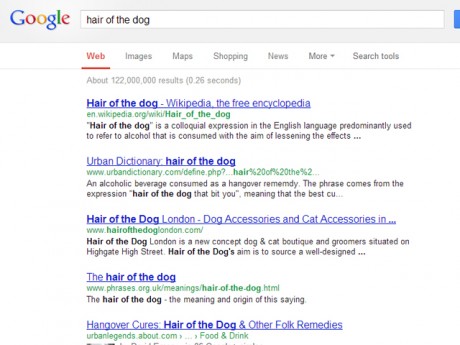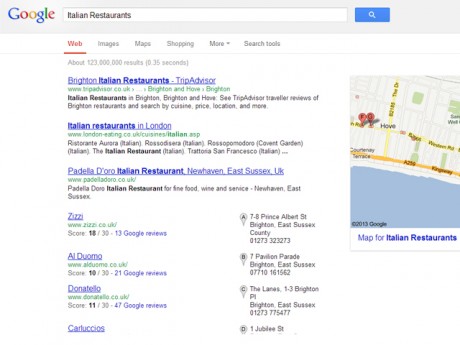How Will Semantic Search Affect SEO In 2013?
What is Semantic Search?
Semantic search is summarised as ‘search systems that consider various points including the context of the search, location, intent, variation of words, synonyms, generalised and specialised queries, concept matching and natural language queries to provide the most relevant search results’.
A good example of this is the search term ‘hair of the dog’ which we all know is an expression used as a method for getting rid of a hangover. In years gone by it is likely that the results provided to the user would be based around dog hair however now search algorithms understand that the most relevant results for the user would be based around hangover cures.
Over the past 12 months search has continued to evolve as Google rolled out a total of 37 updates, the majority of which to their Panda and Penguin algorithms as well as unveiling the Google Knowledge Graph which is constantly keeping digital marketers on their toes!
Google have always maintained that as user demand for more relevant and niche information increases their algorithms would have to improve in order to satisfy the searchers needs. The latest Google search app has incorporated Google Knowledge Graph to provide searchers with relevant and localised answers to questions just by speaking into your mobile device.
For example if I was in Brighton and I wanted to find an Italian restaurant all I would have to do is click on the app and then search for ‘Italian restaurants’ which would provide me with the following information:
As you can see without me specifying Google has already established that I am in Brighton and has modified the results that I am provided with to make it as simple as possible for me to find an Italian restaurant nearby. This is the beginning of semantic search revolutionising the way in which we search for information on the internet however it is not all plain sailing for Google.
Some critics have argued that due to the way Google’s previous algorithms have been designed do not suit semantic searching. This could be the reason as to why there have been so many Google Panda & Penguin updates in the past 12 months so Google can filter out all websites that are considered to have spammy linkbuilding practices.
It is vital that websites with only the best sources of information relative to user's search term should be appearing on the first page of search results if Google wish to hold the crown as the top search engine and meet consumers every need.
What Is The Future?
The future for Google search is becoming very interesting. At the moment Google search only has the ability to answer direct questions such as ‘what are the Premier League fixtures?’ However as search engines evolve Google have expressed a desire to improve their search further until the search engine can answer questions that are event based.
Amit Singhal (Google’s Senior Vice President & Software Engineer) states that he wants to get Google search to a level where someone can walk up to a computer and ask, “What is the best time for me to sow seeds in India, if the monsoon is early?” and Google provide them with the relevant answer. How far away this technology is, is up for debate, however once Google can create an algorithm that can find solutions for these types of questions then user experience will dramatically change when searching... The sky really will be the limit.
What does this mean for SEO?
The SEO industry is constantly changing so it is of no surprise to people who practice SEO that semantic search is going to become an important factor to take into consideration when formulating an SEO strategy. Some of the main things that I believe SEO agencies will have to take into consideration in the future are the following:
Keyword Research
Keyword research has always been an essential part of any SEO strategy as companies will optimise their websites based keywords that describe the products or service that the site provides for its visitors. As people are beginning to search for specific pieces of information rather than generalised search SEOs will have to start doing keyword research on localised & longer tail keywords or certain industry related questions that are frequently asked by customers. If your SEO department or agency hasn't started doing this you are already falling behind.
Content
This leads nicely onto content both on and offsite. The phrase ‘content is king’ has been one of the phrases that I keep hearing on a weekly basis since trying my hand in SEO. With the expected advancements in the way Google provides users with information never has that phrase been more relevant to the SEO industry than in 2013.
As explained earlier Google has brought out their Knowledge Graph in order to give people information straight from their searches, in some cases users may not even have to click through to a website to find the information they need. This means content has to be of an extremely high quality in order to get it on to the first page of Google and not just rehashed or worse still duplicate content. A way to do this is to create niche information answering specific questions about a particular topic of interest to those interested in your industry and aim to get that page to be the best source of information for that question.
Linkbuilding Strategies
This has been a hot topic of discussion in the SEO world in 2013 as we all try to work out what the best way is to get relevant links for sites without being penalised by Google Penguin.
I personally believe one of the ways forward is to linkbuild for different variations of a particular keyword rather than just getting loads of the same anchor text links as this could get penalised by Penguin. This way you will slowly start to rank for more variations of your target keyword which in turn will improve the authority of the website not just for your target keyword but other relevant terms, such as questions searchers are asking in your industry.
These are just a few things that are affecting the SEO industry moving forward into 2013. In my next blog post I will expand on the types of linkbuilding techniques currently being used in the SEO industry and how they affect rankings and conversions of websites.
Make sure you check back at the ThoughtShift Blog for all the latest news and updates.
